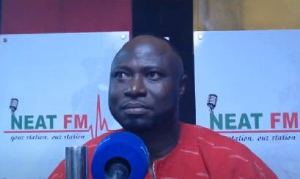- Home - Entertainment
- Lifestyle News
- Entertainment Videos | TV
- Year In Review
- Music News
- Entertainers
- Entertainment Archive
- Entertainment Photos
- Jokes
- Entertainment Headlines
- Ameyaw Debrah
- Brown GH
- Celebrities Buzz
- GH Base
- Ghana Celebrities
- Gh Gossip
- GH Page
- GH Splash
- Hot Gossip GH
- YEN

Entertainment of Monday, 4 November 2013
Source: Ebenezer Anangfio
Late start of shows: Who takes the blame?
This year's Miss Malaika finals started very late and as usual the organisers came up with all sorts of excuses. As of now, the fact that an entertainment show like Miss Malaika and other pageants start late is no longer a focal point to most reporters.
This I guess is as a result of how frequent the phenomenon has become in this part of the world. Invariably, the habit has gradually crept into our system and is accepted as normal.
Quite often, when shows start late, event organisers are heavily criticised and subjected to all manner of insults. However, nothing is said about the attitude of patrons to these shows.
In as much as criticising the organisers is not entirely out of place, patrons sometimes also deserves some level of bashing since shows are delayed due to two main reasons; either the organisers deliberately start event late and like always, cite circumstances beyond their control or patrons to the shows do not turn up early.
When a show starts late therefore, who should be blamed? Is it the event organisers or the patrons?
It feels awkward when after queuing for about an hour or more to make your way into an auditorium you go to meet a virtual empty place? Again, it is also embarrassing to have a show that is advertised to start at 7pm eventually kicking off one or two hours late?
For someone like me and I believe others who have to shuttle from one event to the other in one night, the late start of events present a problem. A delay in the start of one event therefore will affect the attendance of others and it is very distressing to say the least.
I have been to so many shows and experienced such difficulties on a regular basis and yet I wonder to whom I want to apportion the blame.
Organisers:
Here is an example of how an organiser disappoints patrons: At the premiere of Juliet Ibrahim's first movie, The Number One Fan last week, there was an interesting scene that involved a white lady and the handlers of tickets at the entrance of the National Theatre.
The woman and her friends were still in the queue and it was past the advertised first showing time of 5:00pm. They lost their patience and decided to leave.
She and her friends gave up the dream of being among the few people to see the movie first before it gets on the market due to its late start. As she constantly gazed at her wrist watch, she requested that, something is done or their money refunded to them so they leave the premises.
Coming from a land where people are very conscious of time, she found it very hard to understand the organisers because time they say, is money.
It is inexplicable why organisers advertise to start programmes at a specific time when they know indeed that is not possible. If the idea to start late is to ensure that the venues are filled, that has to be communicated well during the promotion of the event.
It is about time that organisers of programmes be they entertainment or otherwise began respecting time. In the scenario above, did the organiser err or not for not adhering to the advertised time?
Patrons:
Our continued disregard for time has brought about the GMT, not the popularly Greenwich Mean Time but rather ‘Ghana Man Time’.
This attitude of being late to events on flimsy excuses like "there was traffic in town" among others are affecting everyone and should not be tolerated.
Last year, during the Versatile Show by Okyeame Kwame, at the National Theatre, all was set and ready for the show to start an hour before the advertised time. But the organisers had to wait for patrons to make their way into the auditorium before starting.
It appeared as if the show was going to become a flop as the auditorium was still not filled up when it was time to start.
When it did finally start, there were only a handful of people. However, after a little while, spaces got filled up till the auditorium was fully occupied. Clearly, the audience delayed the start of the show. That is why it is not good to lambast only organisers for late start of events, I think patrons to such programmes must take the blame as well.
One place a Ghanaian would not go late is to the stadium to watch a football match because he knows that match officials will not delay starting a game. If a game is scheduled to commence at a particular time, with or without fans at the stadium to cheer on their teams, the game would go on.
I believe the same attitude can be replicated in the entertainment industry? Clearly, it's about time we changed those habits that are affecting the industry negatively. One way of going about it is for organisers to sell advanced tickets.
Looking at the cost involved in putting up a show, it becomes pertinent that event organisers recoup their investments. In doing that, they have resorted to delay tactics just to make sure patrons purchase tickets if they have to see the show.
In many instances, organisers are more under pressure when the event is without a sponsor. But does the lack of sponsors justify the delays?
What's the justification for patrons to attend shows late? Whose fault is it? Who should get the blame?











